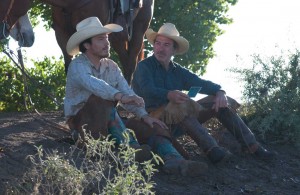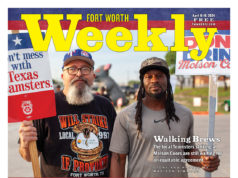Despite having to deal with Jones’ mercurial personality, Cedillo said the role was the most important of his life. As the film made the rounds at Cannes, Cedillo got to see his director at work marketing it.
“Tommy is a very funny, very giving person, but only in private circles. In public, he protects himself,” said Cedillo. “I read almost every interview he gave. He could have given props where they were needed, but instead he would talk about his horses. I think he did a disservice to his film.”
Cedillo also pointed out that the film was given only a limited release in February 2006, a scant two months after the much wider release of Ang Lee’s acclaimed Western Brokeback Mountain. Despite generally positive reviews, the film took in less than $5 million at the box office.

Cedillo got a crash course in the movie industry’s brutal economics at Cannes. The film’s distributor, Sony Pictures Classics, refused to pay for his trip to the south of France. Cedillo went anyway when his in-laws gave him and Claudia the trip as a gift. Once he arrived, the studio agreed to let him take part in the promotion, including attending the glitzy premiere.
The day after the premiere was the festival’s awards ceremony, but the studio didn’t get an invitation for the actor playing the film’s title role. Instead of hanging around to find out whether he’d be let in, Julio took Claudia on a road trip along the French coast, missing out on the awards that the movie won.
Driving back to the airport, Julio and Claudia stopped for some drinks and saw the newspaper announcing his film’s awards.
“I bought a bunch of those papers and told my wife, ‘This is the most expensive newspaper we’ll ever buy,’ ” referring to the $10,000 cost of the trip.
Within months of the film’s release, directors at the Rose Marine Theater (now Artes de la Rosa) took note of it and organized a screening in honor of the actor who had grown up just blocks away.
“One day he just wandered in,” Yvonne Duque said, recalling the first time she met him. Duque, the theater’s artistic director, and Rose Marine executive director Cathy Hernandez were looking for programming ideas.
“His film had just come out,” Duque recalled. “So we thought of the idea of doing a free screening.”
The theater was packed for the showing. Cedillo was there to talk to the audience afterward, answering questions.
“We were struck by his humility,” Duque said. “He didn’t have that Hollywood [vanity]. He was easy to talk to and even seemed in awe at his success. The film seemed so important to him.”
During his talk, Cedillo passed around photos he had taken on set.
“As I began my journey as an actor I realized that the camera was a good way to give people gifts at the end of a film,” he said. “Then I began to realize it’s also a time to take advantage of the lighting that’s been created for me without me doing anything. Now I pay attention to composition, to really approach it in a more serious way.”
Cedillo said he views photography with an “actor’s eye.” He’s planning a gallery exhibit of his photographs, including images of nearly every actor he’s worked with.
In the wake of the critical acclaim for Three Burials, Cedillo has worked steadily. And as he worked, the pressure on him to move to Los Angeles has also been steady.
Looking for his next job after Melquiades, Cedillo immediately bumped up against the L.A. bias –– and the fickleness –– of the film business.
“I remember being on the front cover of the Hollywood Reporter,” he recalled. “When that edition came out, I was in L.A., and I had two different appointments with agencies. This agent asked ‘What have you done?’ So I said, ‘Well, here, I’ll show you,’ and I plopped the copy of the Hollywood Reporter and I said, ‘That came out this week.’ The guy looked at it, smirked, and said, ‘What else have you done?’ ”
The interview ended with the agency telling him they could only help someone who lived in L.A.
“I thought, why am I going to fix something that isn’t broken?” he said.
Instead, Cedillo stayed in Texas and found important parts anyway. He said there’s no secret to finding work, regardless of where you live.
“People ask me how I get so much work living in Texas,” he said. “If they only knew how many times I’ve been rejected. My job is to continue to audition.”
He played a man who may or may not have tortured the paranoid protagonist of Killing Down, a North Texas-made thriller directed and co-written by Blake Calhoun.
“I had a few folks in mind, but once I met [Julio], I knew he was perfect,” said Calhoun, who did not audition any other actors for the role. “He can create a character who is simultaneously intimidating but approachable, crazy while seeming completely levelheaded. You’re just as likely to see him in a small personal indie [film] as in a summer blockbuster, which really says a lot about his abilities and his passion for his work.”
Cedillo said having a great manager and agency has relieved part of the pressure to move to the West Coast. The Mary Collins Agency has represented Cedillo since 1990, an unusually long stretch in the industry.
Collins acknowledged that Cedillo’s Fort Worth base can present a challenge, especially on jobs that are open-ended. An expected one day of work on the police procedural TV show The Bridge, for instance, turned into two and a half weeks. Still, she admires what he’s been able to accomplish from North Texas.
“He’s been able to have the best of both worlds,” she said. “Those he works with are always amazed that he’s based in Texas, but he has worked these past 20-plus years to build a reputation. He’s proof that an actor doesn’t have to live in Los Angeles to work there.”
“Yeah, I probably still need to move to L.A, but there needs to be a balance. Moving to L.A is too much of a lottery,” Cedillo said. “The bulk of my money isn’t from movies necessarily. I do a lot of voice-overs. I’m filling a niche here. So why am I going to move to L.A. on a chance?”
********
Early this fall, Cedillo’s next big film, Frontera, will hit the screens. The film follows the tribulations of a Mexican immigrant (Michael Peña) who crosses the border illegally to find better work. Peña is wrongfully blamed for the accidental death of the wife of a retired sheriff (Ed Harris). Eva Longoria plays Peña’s wife, who enlists the help of a smuggler turned kidnapper (Cedillo) to bring her to her husband.
Berry cast Cedillo for the role of the film’s villain on the advice of the film’s executive producer, Eric Williams, who also was a producer of The Three Burials of Melquiades Estrada. Williams called Cedillo a versatile actor who can “slide right into any character.”
“There were a couple of roles that I felt Julio was good for,” Williams recalled. “We ended up casting him for the role of a very antagonistic and cruel person. He actually welcomed it.”
Playing such a character didn’t come easily to Cedillo. “Eva Longoria is a TV icon,” he said. “She’s kind of like our Oprah Winfrey in the Latin world, so having to be her tormentor was a little bit daunting to me.”
On the set, Cedillo had to allay fears that he didn’t have the right look for the part, which was listed as “the ugly man.” He was able to explain to Berry that his nice-guy looks could work to their advantage because “that’s the last person you expect to do something really bad.”
Convincing the crew that his looks wouldn’t be a problem was only the first part of his preparation just days before the filming.
“We think [coyotes] are bad. They’re not really nice people, because they’re trafficking human beings,” he said. Still, taking that approach can be counterproductive for an actor.
“I don’t see my character as being bad,” Cedillo said. “What motivates this guy? He’s a victim of circumstance, too. He needs money. He has to pay someone above him to help him. … I have to reveal some of the humanity in a short amount of time in the way I handle the language.”
Some of the more violent scenes in Frontera called for Cedillo to throw Longoria into a van and beat her. Berry said Cedillo’s preparation and his physical dexterity helped the scenes go smoothly without anyone being injured.
“He gets excited about the work and the story,” Berry said. “If you have a good actor like that, they tend to run off with the character. They’ll even know more about the character than the director does. I’m very proud of what he did, and if I can find an excuse to use him again I’d like to.”
On the set, Longoria and Cedillo became friends. When he wasn’t tormenting her on camera, he was finding her a blanket (several scenes required her to be undressed) or cracking jokes between shots. Longoria loved his photos and hired him to shoot production stills (photos) of her short film Out of the Blue, directed by Ron Howard and produced by Canon for Project Imagination.
Williams said Cedillo makes an instant impression on anyone he meets.
“Julio is an easygoing guy who’s easy to talk to. The instant you meet him you want to grab a drink or have lunch with him,” he said. “I encourage him to keep taking any roles he’s offered because he’ll have no problem. The guys who can do what Julio does will always have work.”
********
Summer means the same routine for the Cedillo family as it does for many families with two school-age children and working parents — shuttling children among grandparents, summer camps, and family dinners. After Julio finished shooting The Bridge in Los Angeles in May, he and Claudia were grateful for a bit of normalcy back in Fort Worth.
Claudia said a big part of their success has been the support she and Julio get from their parents.
“I don’t think we could be today where we are with our careers, our marriage, and our wonderful kids without the constant and unconditional support of our family,” she said. Claudia’s father Carlos recently retired from the same job that brought Claudia, her mother Graciela, and two sisters to North Texas. His new job is watching and tutoring Karina and Julian and two other grandchildren several days a week. Claudia described her mother and mother-in-law as “two of the most giving and strongest women” she knows.
The Cedillo family is firmly planted in North Texas, and Julio said they have no plans to move. After her childhood experience of moving across several South American countries, Claudia said Fort Worth is home.
The dual life has its quirks, like when Cedillo returns from shooting violent scenes and dealing with celebrity actors.
“When you come back, [you’re reminded] that’s not reality. I’ll go to the parent meetings at Fort Worth Country Day School, and there’s a mom in a track suit asking me how my week went. It doesn’t take me that long to come back to reality. But it’s not just the role I take on that’s hard to come out of, it’s the circus [of filming on set].”
********
Cedillo recounts a story about going drinking with the main cast members and director of Cowboys & Aliens and finding himself alone with Harrison Ford outside Santa Fe’s El Farol bar. Cedillo told Ford about having watched Star Wars in Mexico and asked how it felt to have been part of a film that touched so many people.
Ford responded that he was no more talented than the sound man on any film, and when Cedillo praised him for being humble, Ford said, “Fuck humility! You’ll get nowhere fast! The important thing is, you’ve got to know what your utility is. When I walk on the set, I gotta be useful.”
It’s advice that Cedillo has taken to heart. He’s aware that many of the children he knew growing up on the North Side are still struggling and don’t hear enough success stories like his.
“I’m a lunchbox actor. I’m here to show up and do the work. I’m old school,” he said. “I’m proud of everything I’ve done, but the one thing I’m most proud of is that I’ve been able to take on different kinds of roles and be unique every single time.”
Fort Worth freelance writer Edward Brown can be reached at ejb0017@yahoo.com.











